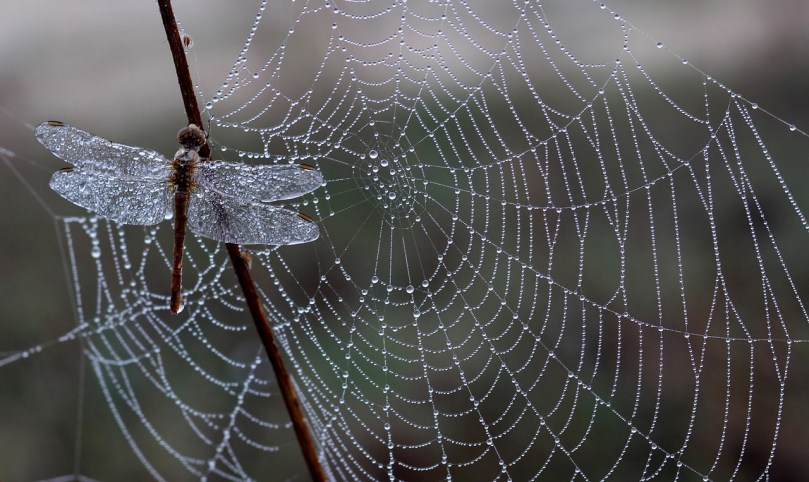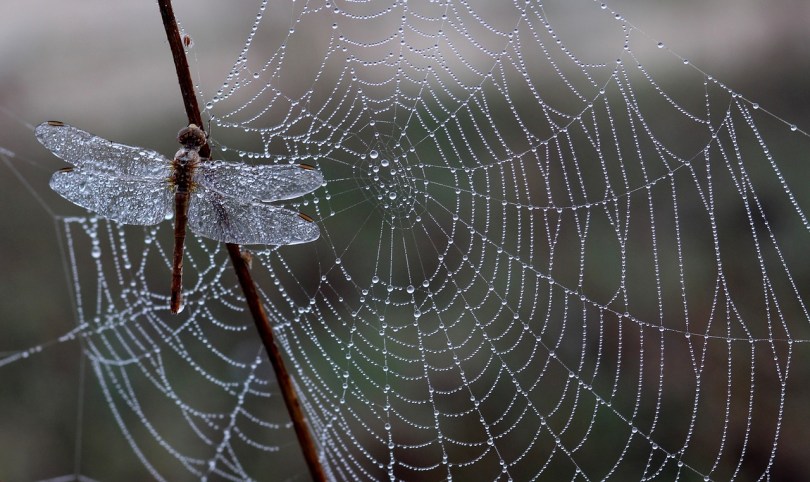What else in nature is like the spider web?
Horrible, lovely little creations, woven by horrible, lovely little creatures — a perfect little metaphor for writers and their stories.
Well, kind of.
Spiders, after all, spin webs not because they’re getting older and they’ve always wanted to be web spinners, and if not now, when? They spin webs because their spidery nature compels them to. They spin webs because if they don’t, they will literally die. That’s writer-y.
And when they spin their webs, they don’t stress out about it. They don’t look to the great web spinners of days gone by or read web-weaving advice on the interweb (haw). They get that hot little urge across the thorax and set about spinning the web that nature intended. Writers, on the other hand, are a bit prone to obsessing. A bit emotionally attached to their work. A bit more neurotic.
And they (spiders!) weave these bloody marvels. Stunning in their perfect cascade of concentric circles, yet shot through with smears of imperfections. Mathematical in their construction, yet organic in their execution. Each one a thumbprint or a snowflake — perfectly like every other, yet perfectly distinct. Poetry in nature. The kind of thing that could make even a frozen-hearted atheist like me think there’s a design behind all this.
(Of course, the spider web’s design isn’t there for beauty, it’s there so the spider can entrap hapless insects and devour them from the inside out, but that part doesn’t really work for my metaphor, so we’ll just skip over that.)
But that’s hardly our regular interaction with a spider web, is it? Our usual, default interaction with a spider web goes something like:
- *walking along, minding my own business, probably thinking about that video with the fainting goats I watched*
- *steps into spider web strung between a car and a tree in a parking lot of all places*
- *staggers around blindly trying to pull invisible threads off my face and shoulders*
- *spots a speck in my peripheral vision and oh GOD IS IT ON ME IS IT ON ME*
- *sets fire to self in an effort to banish that sticky feeling*
Because we just don’t notice them. They’re not a part of what we’re looking for as we go through the world, so we walk right by them never knowing they’re there in the best case, or blunder into and destroy them in the worst. And we therefore miss out on a treasure trove of ephemeral jewelry every day.
Unless something forces you to see them.
Like, for example, a foggy haze hanging over your early-morning run.
Fog is its own wonderful writing metaphor. It obscures what’s in the distance and forces you instead to pay extra-close attention to what’s all around you. Like the spider web hanging in the branches of that tree overhanging the road. Or that one nestled in your neighbor’s topiary. Or that one clinging to the underside of a streetlamp. Or — holy sharknado, there are spider webs EVERYWHERE.

Invisible and unnoticed most of the time, the kiss of the morning fog makes them explode into life. Each of them the tiny and insignificant void-shout of a creature fighting for its survival in a pitiless universe. Insignificant, that is, for all but the unwitting fly that finds itself ensnared.

And those are a writer’s ideas, aren’t they? Perfect little imperfections spun into existence by a creature that literally doesn’t know how not to spin them. Beautiful and terrible and sticky and OH MY GOD IT’S IN MY HAIR AND I CAN’T GET IT OUT.
Look a little bit closer. Notice an idea that might have slipped by otherwise.
Get some spiderwebs in your hair.


Wonderful comparison! Your spider web photo is so good and clear. I’ve tried to photograph the webs, but they never turn out. 🙂
LikeLiked by 1 person
Hah. The good picture is not mine — and even the crappy one I took only came out because the web was frosted with mist. (Which I guess was the point of the post!)
LikeLike
Oh yeah, I was talking about your photo, not the one with the dragonfly. Compared to the ones I try to take, yours is very good. Maybe if we have a misty day or something I can try again. 🙂
LikeLiked by 1 person
Well double thanks in that case! I had to get REAL close for that shot, lol.
LikeLiked by 1 person
You’re welcome. I’m glad you did get this one, and posted it so we could see. 🙂
LikeLike